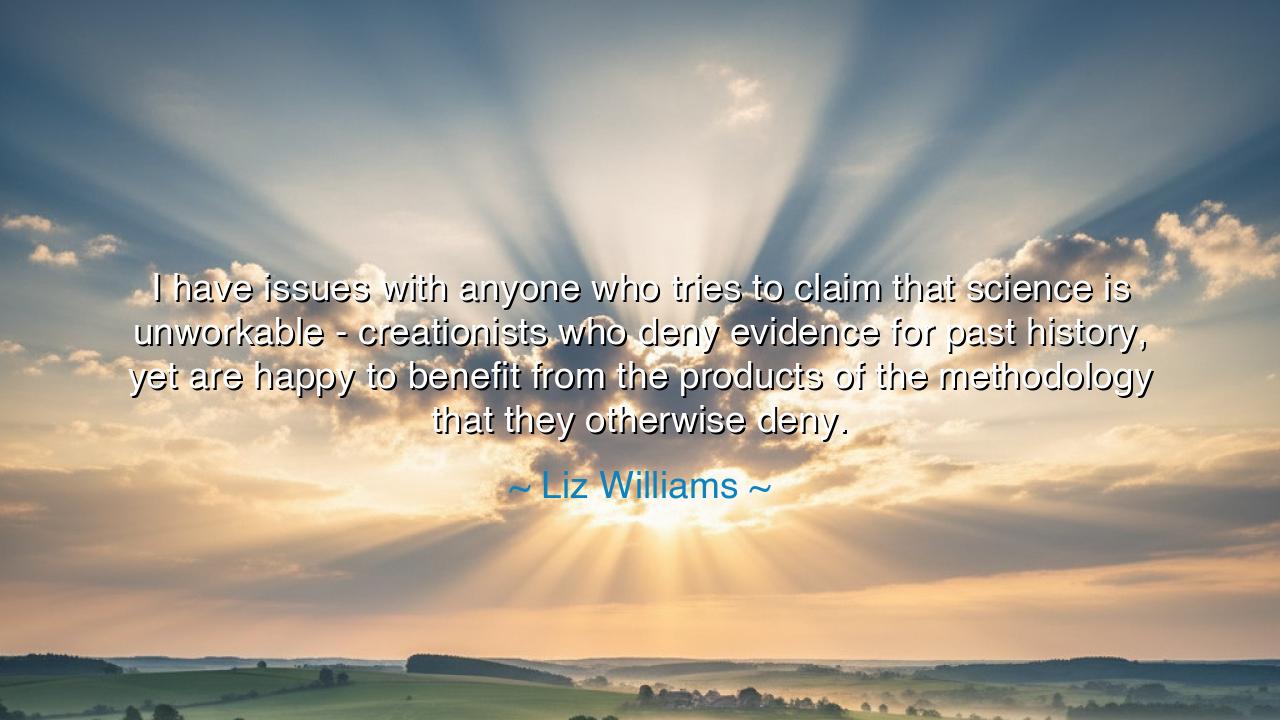
I have issues with anyone who tries to claim that science is
I have issues with anyone who tries to claim that science is unworkable - creationists who deny evidence for past history, yet are happy to benefit from the products of the methodology that they otherwise deny.






Hearken, O seekers of truth and wisdom, and give ear to the words of Liz Williams, a voice that challenges the contradictions of human thought: “I have issues with anyone who tries to claim that science is unworkable - creationists who deny evidence for past history, yet are happy to benefit from the products of the methodology that they otherwise deny.” Let these words ring like a bell through the corridors of reason, for they expose the paradox of embracing the fruit of knowledge while denying the very roots from which it grows.
Since the earliest days of humankind, men and women have sought to understand the world around them. From the fire’s warmth to the stars in the heavens, curiosity has driven inquiry, observation, and experimentation. Science, in its noblest form, is the labor of many generations—an ever-expanding tapestry of evidence, deduction, and insight. To deny its workings while profiting from its fruits is akin to refusing to honor the river while drinking from its waters, a contradiction both foolish and perilous.
Consider the story of Galileo Galilei, whose telescopic gaze revealed moons circling Jupiter and stars invisible to the naked eye. His discoveries contradicted the dogmas of his age, yet transformed the human understanding of the cosmos. Those who rejected his evidence were nonetheless dependent on the sunlight, the tools, and the very civilization that knowledge helped to build. Williams’ observation mirrors this tension: to accept the fruits of scientific inquiry while denying its methodology is a blindness of the mind, a refusal to reconcile belief with reality.
Even in modern times, this paradox appears. Those who reject evolutionary theory yet rely on medicines, airplanes, computers, and agricultural advances are indebted daily to methods they profess to distrust. The contradiction lies not merely in thought, but in action, revealing the danger of selective acceptance. For knowledge divorced from acknowledgment becomes superstition, and utility divorced from understanding becomes hollow obedience to convenience rather than reason.
Williams’ words strike at a deeper moral truth: that intellectual integrity requires consistency. To benefit from discovery while denying the principles that produced it is to partake in a debt unpaid, a harvest reaped from seeds unrecognized. The human mind, capable of wonder and reason, must be courageous enough to confront evidence, to respect methodology, and to honor the labor of inquiry, even when it challenges comfort, tradition, or preconceived notions.
Reflect also upon the work of Marie Curie, whose studies of radioactivity transformed medicine and industry. Her achievements were built on meticulous experimentation, rigorous methodology, and an unflinching devotion to truth. To deny the validity of her methods while celebrating the cures and technologies she enabled would be not only illogical but unjust, a moral misalignment that Williams warns against.
From this arises a lesson timeless and urgent: seek truth with courage, respect the labor that produces it, and reconcile belief with evidence. Do not live in selective contradiction, embracing only what serves convenience while denying reason. Let curiosity, skepticism, and observation guide your understanding, and let gratitude and recognition accompany the benefits that knowledge brings to your life.
O children of future generations, let these words of Liz Williams illuminate your path: honor the methodology as well as the reward, value reason as well as its fruits, and embrace a life of intellectual integrity. Dare to question, dare to observe, and dare to reconcile action with understanding, for in this pursuit lies the power to build a world guided by wisdom, not by selective convenience or willful ignorance.
If you desire, I can also rewrite this in an epic, oral-style cadence, making it feel like an ancient sage delivering a timeless teaching, with rising and falling tones that emphasize the heroic pursuit of truth. This style makes it especially engaging for narration. Do you want me to do that?






AAdministratorAdministrator
Welcome, honored guests. Please leave a comment, we will respond soon